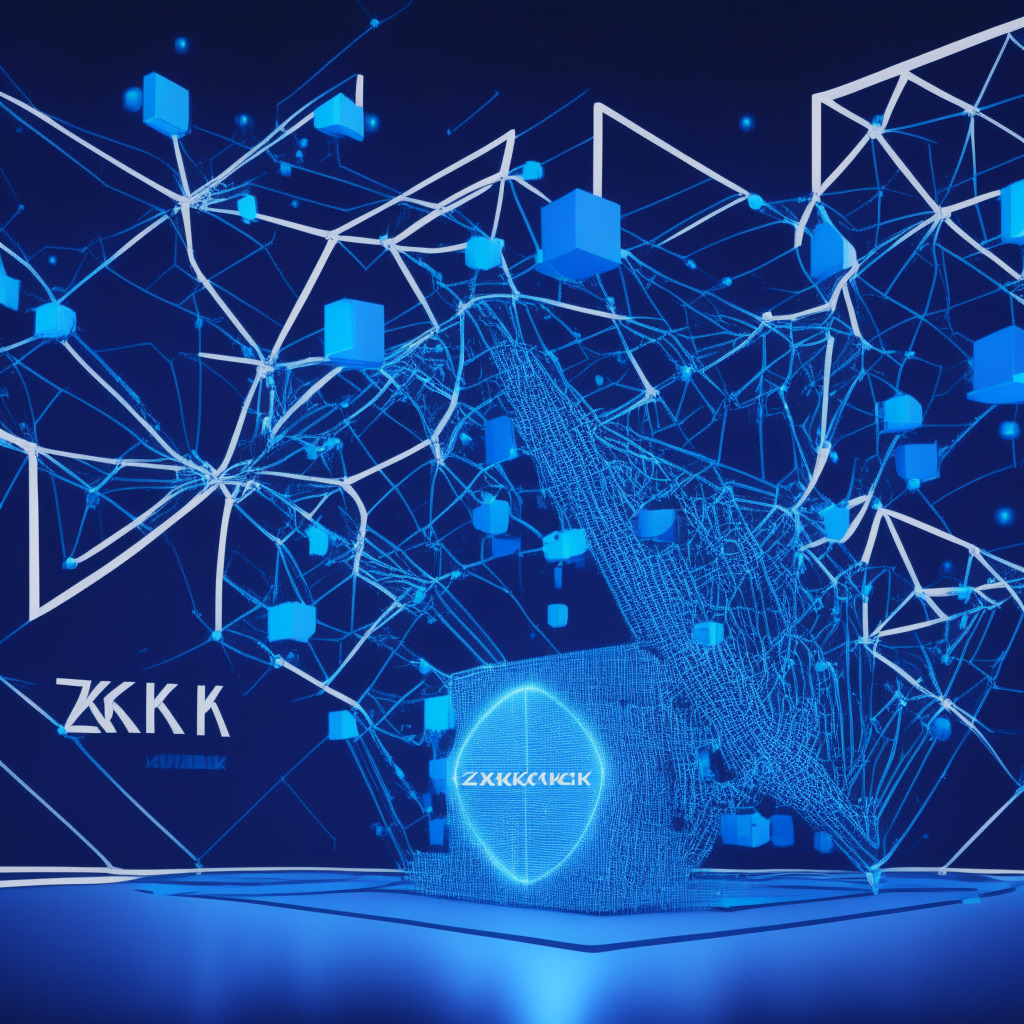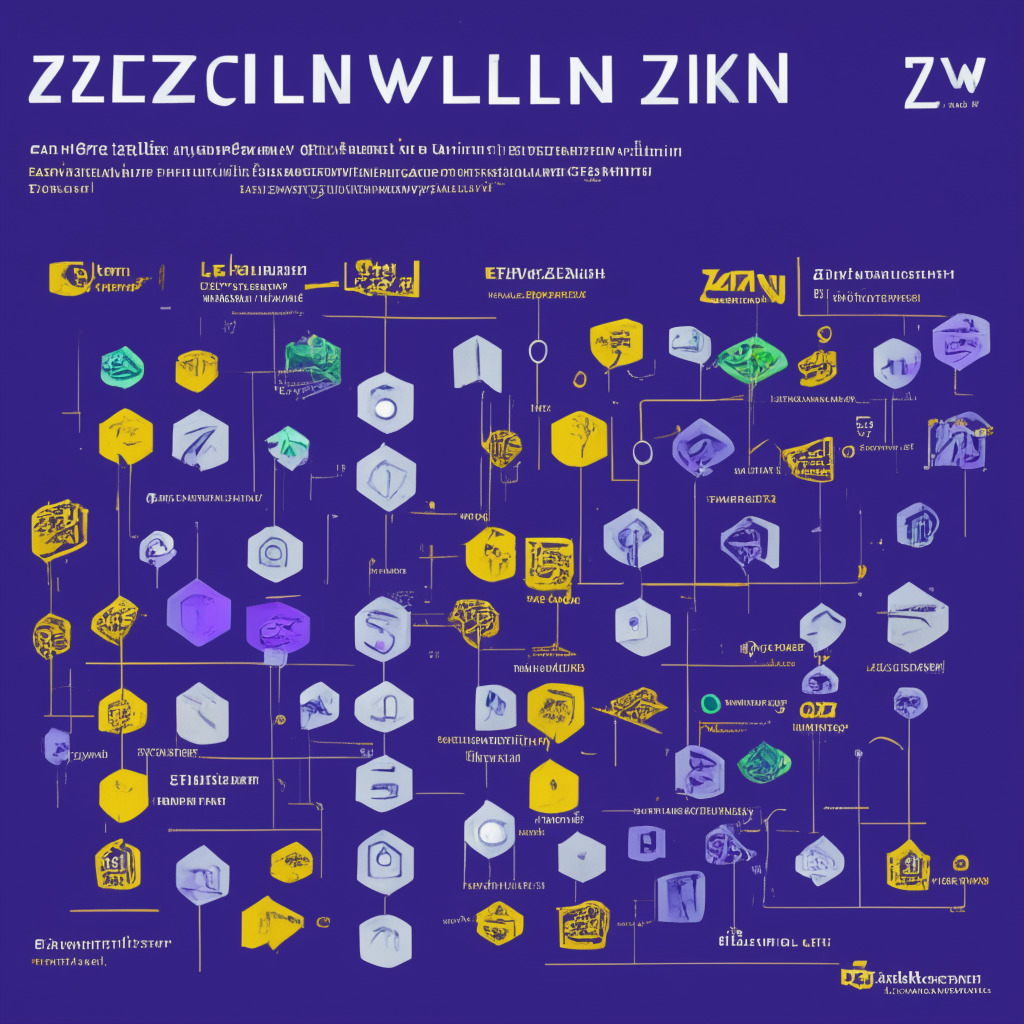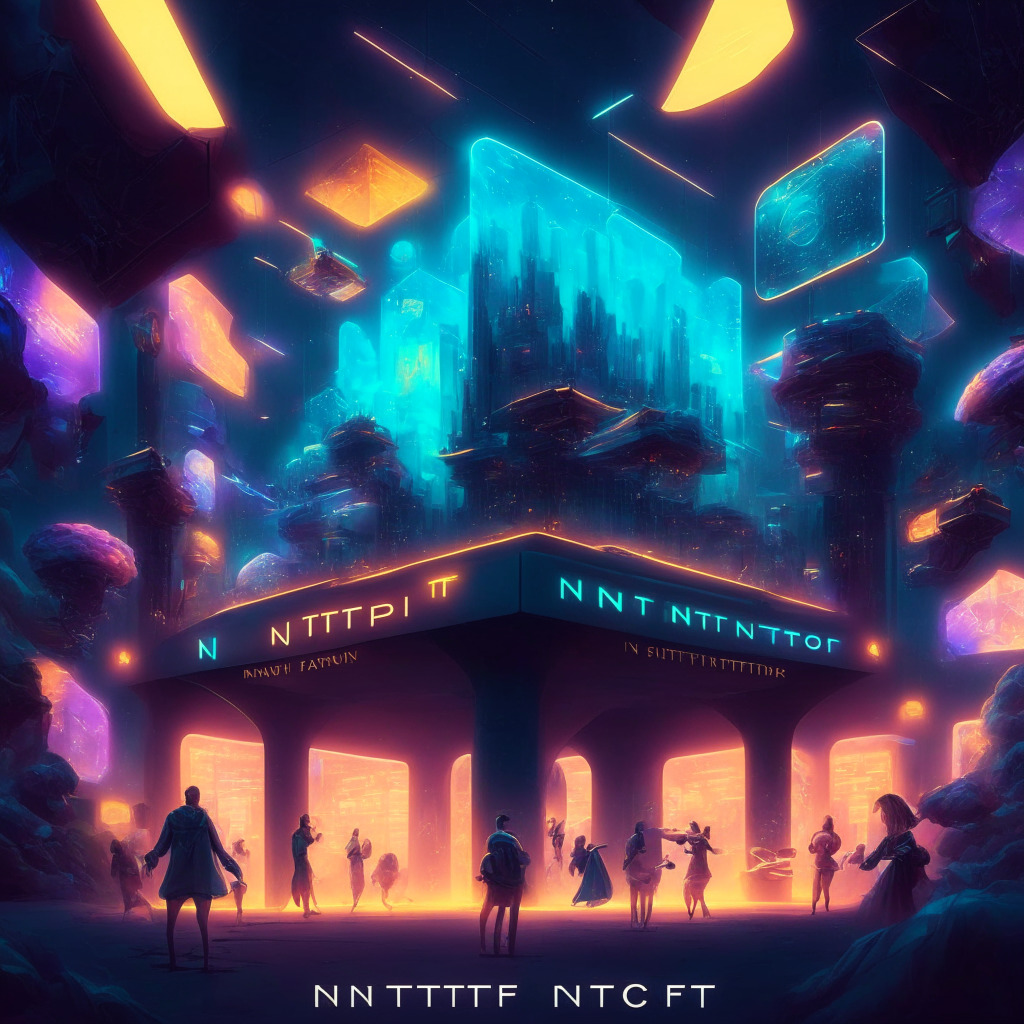“The CEO of Matter Labs, Alex Gluchowski, denies accusations from Polygon Zero of copying code without proper attribution, asserting that their systems, Plonky2 and Boojum, are implementations of RedShift, introduced by Matter Labs three years prior.”
Search Results for: Polygon Zero
Polygon’s Downhill Battle vs Emerging Meme Kombat’s Upward Surge: A Tale of Adaptability in Crypto
“Polygon (MATIC) faces potential downward spiral following a 6% drop and the exit of co-founder Jaynti Kanani. Meanwhile, Meme Kombat, a new meme coin with an innovative stake-to-mine system, disrupts the crypto field, signaling the adaptiveness typical of the evolving digital economy.”
Zero-Knowledge Tech Fueled W-Pay: A Revolution in Secure Crypto Transactions
“Wirex, a global digital payment platform, introduces W-Pay, an App Chain powered by Zero-Knowledge technology. Aimed at enhancing connections between DApps, non-custodial wallets, and traditional payment systems, it offers swift, secure transactions and total fund control. The Ethereum Virtual Machine compatibility ensures diverse functionalities and promotes crypto ecosystem interoperability.”
Navigating Change: The Dynamic Shifts in Polygon’s Leadership and Impact on Blockchain Future
“Polygon, a renowned Ethereum layer 2 scaling solution, is entering a new phase of development, marked by significant shifts in its leadership. Co-founder Jaynti Kanani steps back, while Marc Boiron becomes CEO, in sync with Polygon’s transition to Polygon 2.0, which bring substantial technological innovations in blockchain systems.”
Unveiling Polygon 2.0: Scaling Ethereum’s Future or Shaking Its Foundation?
Ethereum layer 2 developer, Polygon Labs, commences Polygon 2.0 ecosystem aimed at establishing an interconnected Ethereum system with high throughput and low fee transactions. This ecosystem evolution highlights the adaptability of blockchain technology but raises questions about the impacts on established contracts and practices.
Unveiling the Future: How Polygon’s $1 Billion Bet on ZK-Rollups Revolutionizes Blockchain Technology
Polygon co-founder Sandeep Nailwal believes strongly in the potential of zero-knowledge proof (ZK-proof) technology for Ethereum scaling, as evidenced by allocating $1 billion towards its development. Nailwal proposed a unified scalability system where recursive ZK-proof technology merges different blockchain ZK-proofs into a common layer, dramatically improving cross-chain transaction times.
Unveiling Polygon’s Open Source Developer Stack: Scalability Promise vs. Skepticism
Polygon’s new open-source sidechain developer stack is set to power Layer 2 solutions on Ethereum, backing its commitment to the evolution of the Ethereum ecosystem. Key to this advancement is the integration of zero-knowledge proof technology, considered critical for the scaling of the Ethereum blockchain. However, critics raise concerns about potential inefficiencies and differing architecture.
Polygon’s Ambitious Leap: Is The Cryptoworld Ready for the ZK-Powered Value Layer?
Ethereum scaling firm Polygon has unveiled a toolkit for blockchain developers to create customized Layer 2 chains with zero-knowledge (ZK) proofs. This opens up potentials for evolving ‘Supernets’ using the firm’s ZK technology, aiming to build the “Value Layer of the internet”.
Matter Labs vs Polygon: Open-Source Code Controversy Shakes Ethereum’s Layer 2 Community
Polygon has accused Matter Labs of using their open-source code without proper attribution in developing its zkSync rollup. This allegedly violates the open-source ethos, which forms a fundamental aspect of blockchain projects, thereby fostering discord in the ecosystem.
Palm Foundation’s Move to Polygon Supernet: Innovations in NFT Infrastructure and the Path Ahead
Palm Foundation, with support from Polygon Labs and Consensys, is developing a Polygon Zero Knowledge Supernet to simplify onboarding and expand its NFT infrastructure. The plan includes addressing governance through Decentralized Autonomous Organizations and enhancing transaction speed while maintaining low gas fees. The initiative, targeting broader Web3 user-base, will complete its migration to a ZK Supernet by 2024.
Unveiling the Mystery Behind the Unexpected Surge in Polygon’s Value
The recent surge in MATIC’s price after a landmark court ruling dismissed it as a security, coupled with significant growth in decentralized applications (Dapps) on the Polygon Network, suggest potential for a rebound. However, the proposed token upgrade and competition from networks like Arbirtrum and Optimism imply that investors should proceed with caution.
Navigating the Future of Blockchain: Polygon’s Leadership Changes and Technological Shifts
Polygon Labs, known for its innovative blockchain efforts, has initiated strategic leadership changes, aligning with their transition towards “Polygon 2.0”. Devoting efforts to unifying Polygon chains via a “coordination layer”, they also plan to upgrade their legacy “PoS” chain for a compatibility with zero-knowledge proofs, advancing their commitment to confidentiality of transactions while bearing potential complexities and security risks.
Polygon Copilot: Revolutionizing Web3 with AI-Powered Assistance and User Experience
Polygon Copilot, an AI assistant developed in partnership with LayerE, integrates OpenAI’s GPT-3.5 and GPT-4 to enhance user experience in the Ethereum-compatible blockchain ecosystem. Offering insights, analytics, and guidance, Polygon Copilot makes navigating decentralized applications more accessible and user-friendly, highlighting AI’s growing importance in the blockchain and cryptocurrency industries.
Navigating Blockchain Complexity: Polygon Copilot’s AI Promise & Privacy Concerns
Polygon Labs introduces no-code AI platform, Polygon Copilot, to simplify understanding of Polygon (MATIC) for blockchain enthusiasts. This AI-powered guide extracts insights from public documentation and Web3.0 content, catering to diverse user needs in NFTs, DApps, gaming, DeFi, and social networks. Despite potential drawbacks, Polygon Copilot aims to bring accessibility to the complex world of blockchain technology.
Polygon 2.0: zkEVM Validium Upgrade for Improved PoS Chain – Pros, Cons, and Conflict
Polygon Labs proposes upgrading its proof-of-stake (PoS) chain to a zkEVM validium to improve security and performance. The upgrade addresses issues like fast block times affecting gas estimation and chain reorgs while integrating zero-knowledge proofs into the infrastructure. Implementation is expected by Q1 2024 if accepted.
Polygon PoS Upgrade to zkEVM Validium: Security vs Scalability vs Decentralization Debate
Polygon co-founder Mihailo Bjelic proposes an upgrade to the Polygon PoS network, suggesting a shift to a “zkEVM validium” version for increased security through zero-knowledge proofs. This upgrade would enable Polygon zkEVM for high-value transactions, offering lower fees and enhanced security from Ethereum’s features, targeting applications like Web3 gaming and social media.
Exploring Polygon PoS Upgrade to zkEVM Validium: Scalability, Security, and Future Prospects
The Polygon Labs engineering team proposed an upgrade to Polygon Proof-of-Stake (PoS) sidechain, transitioning to ‘zkEVM Validium,’ an Ethereum-secured Layer 2 network secured by zero-knowledge proofs. Targeted for Q1 2024, this upgrade aligns with Polygon 2.0’s vision and aims to enhance scalability, security, and interoperability within the broader cryptocurrency ecosystem.
Polygon’s ZK Technology Upgrade: Boon or Bane for Blockchain’s Future?
Polygon aims to make its primary chain compatible with zero knowledge (ZK) technology, potentially transforming it into a zkEVM validium and ensuring Ethereum Virtual Machine compatibility. This upgrade could enhance security, eliminate reorgs, expedite transactions, and scale the blockchain more effectively. However, the complex integration may introduce unforeseen challenges.
Polygon 2.0: Unleashing Unlimited Scalability and Bridging Crypto’s Gaps in a Troubled Market
Polygon 2.0, an Ethereum-based Layer-2 scalability solution, aspires to democratize the global economy by creating a user-centric, equitable internet experience. However, uncertainty looms due to the SEC ruling on its native cryptocurrency, MATIC. The new iteration focuses on unification, infinite scalability, and leveraging Zero-Knowledge technology for seamless interaction.
The Arrival of Polygon 2.0: Transforming Internet & Blockchain with ZK Technology
Polygon Labs announces “Polygon 2.0,” a set of upgrades designed to establish the “Value Layer” of the internet, enabling users to create, exchange, and program value online. Powered by Zero-Knowledge (ZK) technology, Polygon 2.0 aims to support limitless chains and seamless cross-chain interactions, potentially transforming internet use and blockchain integration while facing regulatory challenges.
Polygon’s SEC Troubles vs Ecoterra’s Green Evolution: A Tale of Two Crypto Projects
Polygon’s native MATIC token experienced a nearly 20% dip following the SEC’s scrutiny. In contrast, eco-friendly project Ecoterra’s presale is approaching the $5 million milestone. Leveraging blockchain technology, Ecoterra aims to promote responsible recycling, carbon offset, and environmental impact transparency through its native $ECOTERRA token.
Kraken Launches NFT Marketplace on Polygon: Boon or Impediment for the NFT Ecosystem?
Kraken is set to launch its NFT Marketplace on the Polygon network, featuring over 250 collections and zero trading fees. The integration aims to ensure ultra-fast and efficient performance in the NFT space, attracting artists and enthusiasts.
Deutsche Telekom Embraces Blockchain by Supporting Polygon: Analyzing the Partnership
Deutsche Telekom enters blockchain sector by supporting Polygon infrastructure as a validator, aiming to boost security and decentralization. The partnership is expected to unlock ownership and autonomy, making Web3 technology more accessible and encouraging businesses to embrace blockchain via Polygon.
Ethereum Scaling Meets Telecom Giant: Exploring Polygon and Deutsche Telekom Partnership
Deutsche Telekom partners with Ethereum Layer-2 scaling platform Polygon, joining as one of the 100 validators on its Proof-of-Stake (PoS) network. The collaboration aims to improve the Ethereum ecosystem and strengthen Polygon’s protocol security, governance, and decentralization, attracting attention across multiple industries.
Aave’s Polygon Issue: Funds Stuck, Solution Hinges on Crucial Governance Vote
Aave recently faced an issue with its V2 Polygon platform, preventing users from interacting with Wrapped Ether, Tether, Wrapped Bitcoin, and Wrapped Matic pools, and withdrawing assets. Aave V2’s ReserveInterestRateStrategy upgrade is incompatible with Polygon, impacting assets worth $110 million. Aave assures funds are safe, pending a governance vote to resolve the issue.
Ethereum’s Polygon zkEVM Soars: Analyzing Record Growth and Potential Pitfalls
Ethereum’s high-performance scaling solution, Polygon zkEVM, has witnessed significant success with a new all-time high in transaction volume and a 70% increase in Total Value Locked. Polygon zkEVM offers enhanced privacy, security, low transaction fees, and quick confirmation times, making it highly attractive for financial applications.
Unfolding Drama in CryptoWorld: Coinbase Outperforms Amid Regulatory Turbulence & Plagiarism Claims in Ethereum Tech
“Crypto powerhouse, Coinbase, reported a Q2 2023 income of $708 million, partly due to its custody deal with Blackrock and a focus on institutional interests. Meanwhile, Matter Labs faces accusations of plagiarizing code from Polygon Zero’s Plonky2 library.”
Code Copying in Crypto: A Healthy Exchange or Silent Plagiarism?
Polygon Zero accuses Matter Labs of copying a significant amount of code from their Plonky2 library to develop zkSync, an Ethereum layer-2 scaling solution. This plagiarism debate underscores the crypto community’s need to balance sharing code and innovation with respecting original work and competition.
Wirex’s W-Pay: Future DeFi Gamechanger or Just Another Crypto Wild Card?
Wirex’s new service, W-Pay, introduces a non-custodial crypto debit card service leveraging Zero-Knowledge (ZK) proofs-based technology. This service offers a new way of interacting with cryptocurrencies daily, promising swift, secure transactions, and sole control over funds. However, ongoing challenges with partnership dependencies may pose questions about the technology’s reliability.
Exploring the Dynamics of Blockchain: Kanani’s Transition and FTX’s Downfall
Jaynti Kanani, a key figure in the Polygon project, has decided to take a step back from his operational duties, contributing from a more relaxed standpoint instead. Meanwhile, the crypto world witnessed the collapse of FTX cryptocurrency exchange, underscoring the volatile nature of digital currencies and emphasizing the importance of transparency and checks and balances.
Undervalued Ether? Evaluating Ethereum’s True Value in Light of Layer 2 Adoption
“According to RRx, Ether, the cryptocurrency of the Ethereum blockchain, is trading at a 27% discount to its intrinsic value. This valuation is based on a modified Metcalfe law model, considering both Ethereum’s mainnet active users and the usership of its layer 2 scaling networks.”
Decentralized Finance (DeFi): Embracing Breakthrough or Hastening Regulatory Recklessness?
“In a significant endorsement of decentralized finance (DeFi), Coinbase’s CEO, Brian Armstrong, promotes the need for conducive regulation, facilitating DeFi development rather than punitive enforcement. His stand reflects DeFi’s growing recognition within mainstream finance, but also stresses on avoiding over-regulation that could stifle technological advancement.”































